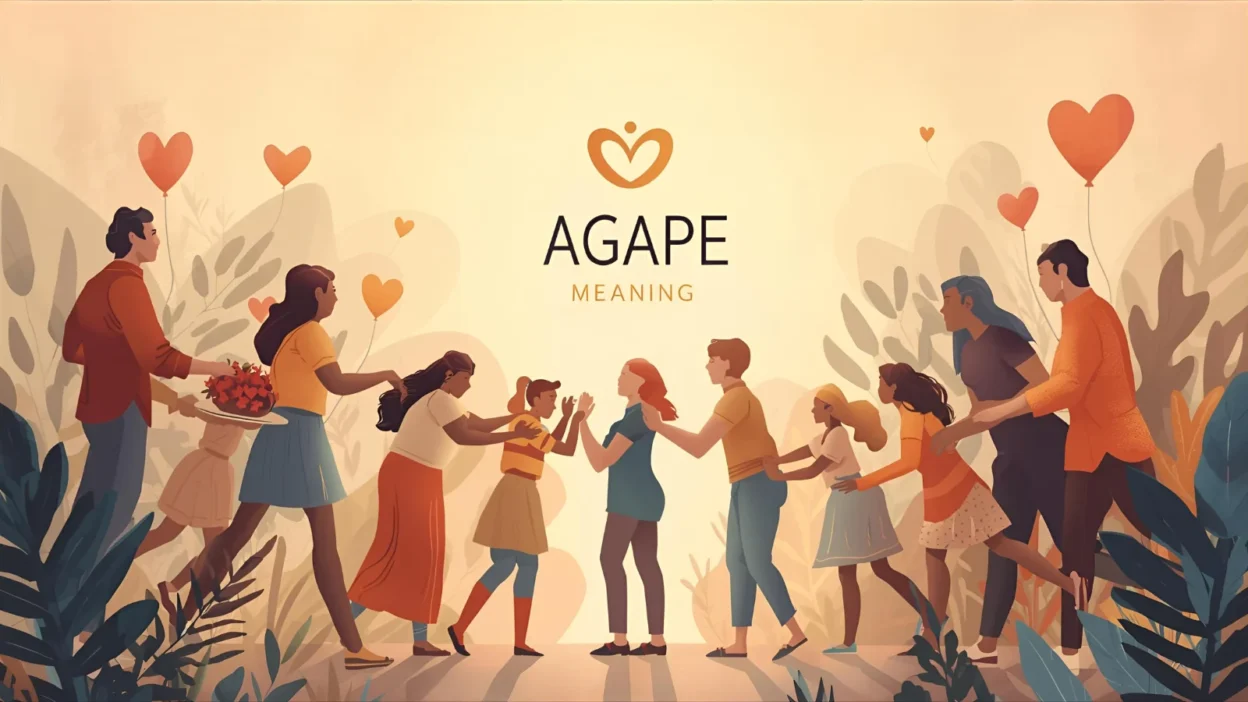Have you ever come across someone saying “agape love” and wondered what it truly means?
Whether you’ve seen it in a church sermon, a quote on social media, or even in a heartfelt text, agape is a word that carries deep emotional and spiritual meaning.
But beyond its ancient roots, it’s also finding new life in modern conversations about kindness and humanity.
Let’s explore what “agape” really means, how it’s used today, and why it’s still one of the most powerful words for unconditional love.
💡 Quick Answer
Agape (pronounced “ah-gah-pay”) means selfless, unconditional love — the kind that gives without expecting anything in return.
It comes from ancient Greek and was used to describe the purest form of love — the love that seeks the good of others, even when it’s hard.
🧠 What Does “Agape” Mean in Text?
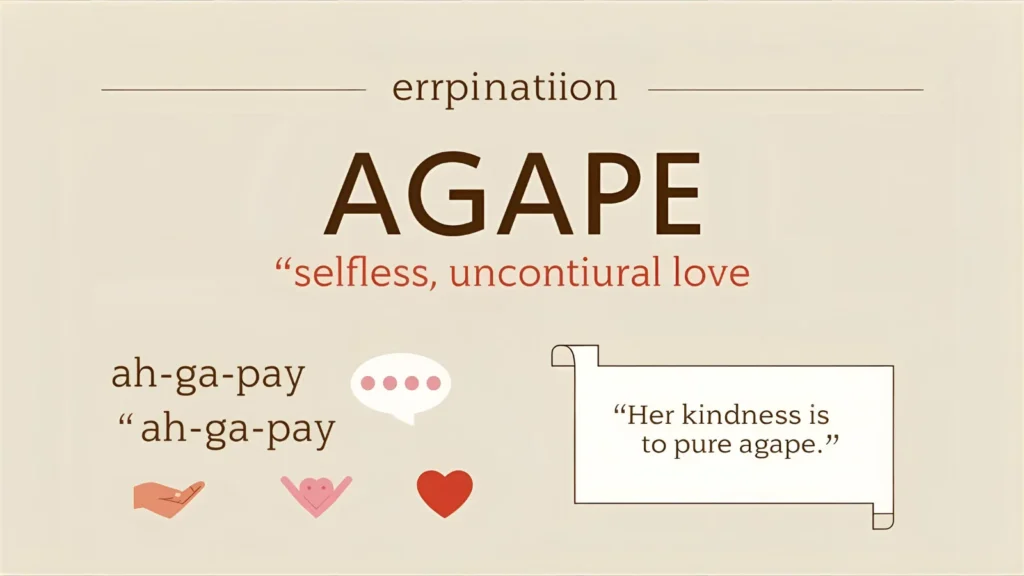
When someone says “agape” in a text or message, they’re often referring to deep, genuine love — not romantic or physical, but the kind that’s spiritual or emotional.
Examples:
- “Her kindness is pure agape.”
- “That’s agape love — helping even when no one’s watching.”
In texting culture, agape might appear in motivational posts or captions like:
“Live with agape ❤️ — love without limits.”
So while it’s not everyday slang like “LOL” or “WTV,” it’s used to express sincere affection, compassion, or faith-based love.
🏛️ Origin and Meaning in Greek Culture
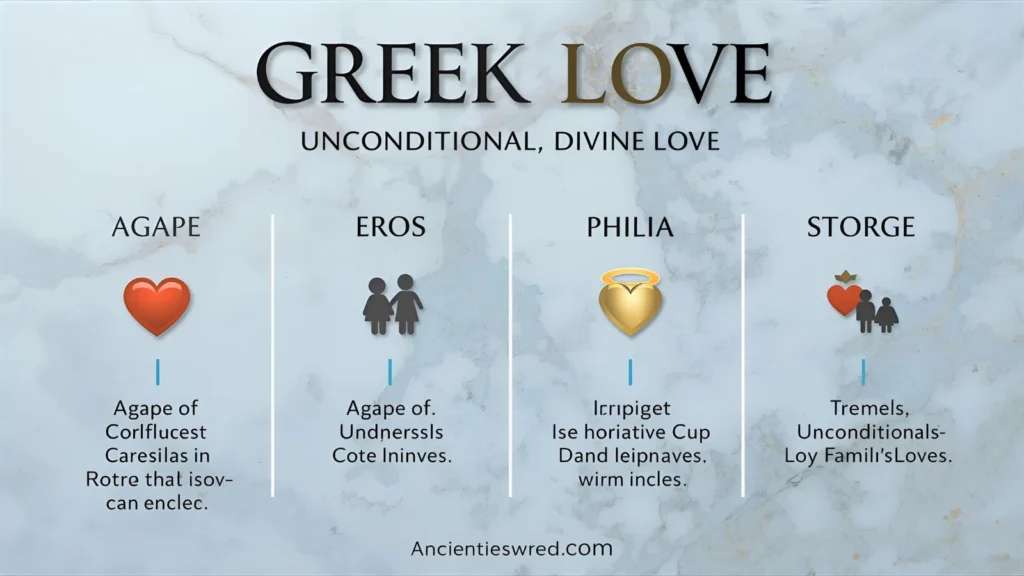
The word agape (ἀγάπη) originated in ancient Greek philosophy and appears frequently in the New Testament of the Bible. In Greek thought, agape was one of the four types of love:
- Eros – romantic or passionate love
- Philia – friendship love
- Storge – family love
- Agape – divine, unconditional love
Among these, agape is considered the highest and purest form, transcending emotions and focusing on selfless care for others.
🙏 Agape Love in Christianity

In Christianity, agape is central to the faith. It’s the love God has for humanity — pure, forgiving, and infinite.
“For God so loved the world that He gave His only Son…” — John 3:16
This verse beautifully captures the essence of agape. Christians are encouraged to show agape love through acts of kindness, forgiveness, and compassion — not because they expect anything in return, but because love itself is divine.
❤️ How to Show Agape Love in Everyday Life
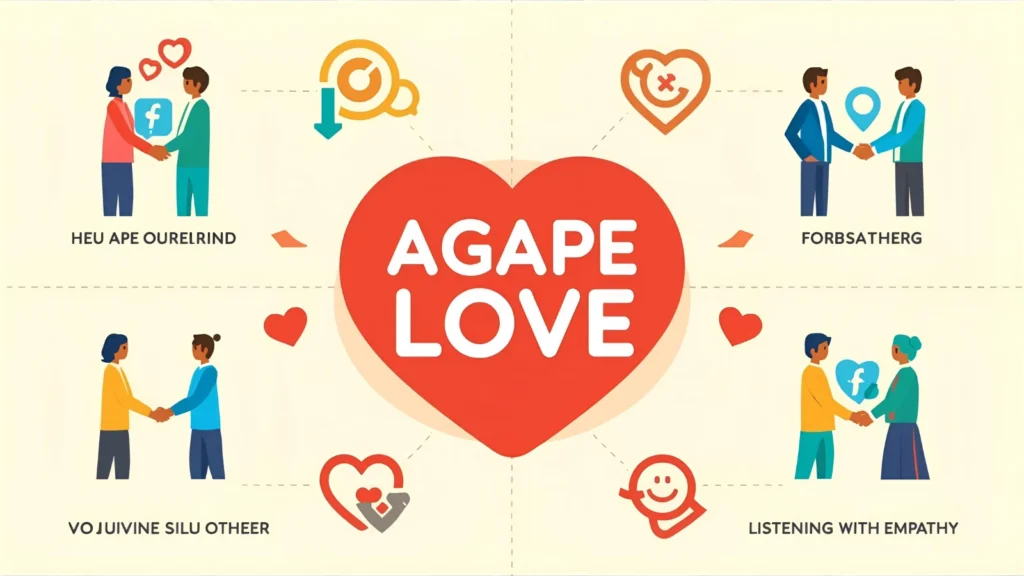
You don’t have to be a philosopher or theologian to live with agape. It’s something we can all practice daily through empathy and generosity.
Here are a few real-world examples:
- Helping a friend who can’t repay you.
- Forgiving someone who hurt you.
- Volunteering time or resources for a cause.
- Offering emotional support without expecting recognition.
- Listening deeply when someone needs to talk.
These acts of selfless care mirror the essence of agape — love that gives freely.
🕊️ Agape in Modern Culture
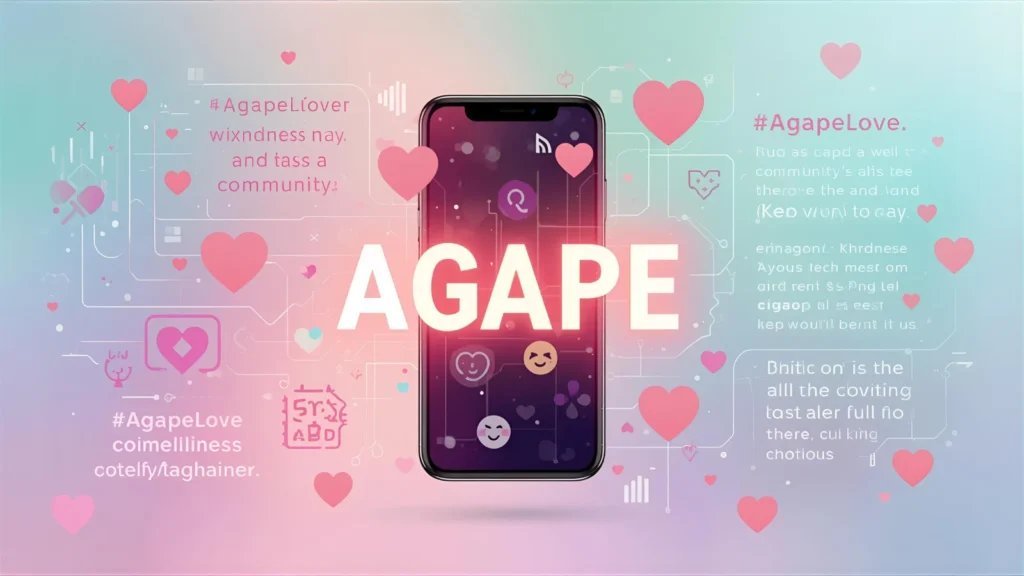
Today, agape has found its way into motivational quotes, wellness talks, and online movements. You’ll see it trending in hashtags like #AgapeLove, often used to spread positivity, mental health awareness, and compassion.
For example:
“The world needs more agape energy — love that heals without judging.”
Even in leadership, therapy, and community work, agape love is being recognized as a force that builds connection and emotional resilience.
🔍 Agape vs. Eros vs. Philia vs. Storge
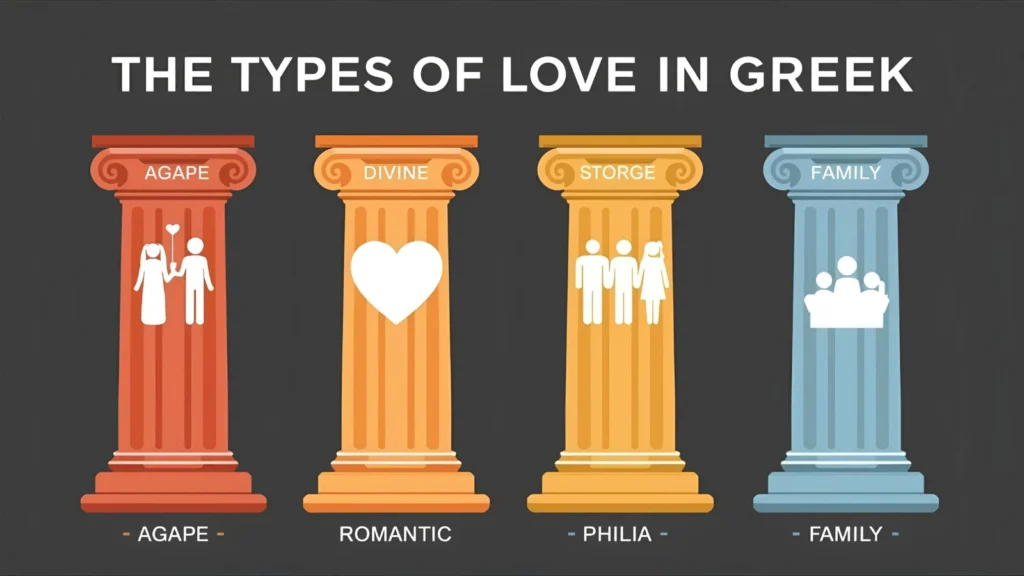
This distinction helps us understand that agape stands out because it’s universal and giving, not dependent on feelings or attraction.
| Type of Love | Meaning | Example |
|---|---|---|
| Agape | Unconditional, selfless love | Helping others without reward |
| Eros | Romantic, passionate love | Love between partners |
| Philia | Friendly affection | Loyalty between close friends |
| Storge | Familial love | A parent’s care for their child |
✝️ What Does Agape Mean Spiritually?

Spiritually, agape represents the highest vibration of love — one that goes beyond emotions and becomes a way of life. It’s love rooted in faith, compassion, and service.
People who live with agape often describe it as:
- “Loving without reason.”
- “Caring without judgment.”
- “Serving without seeking reward.”
That’s why agape love is often called divine love — it mirrors the nature of God and reflects the soul’s purest form of connection.
💬 Synonyms for Agape
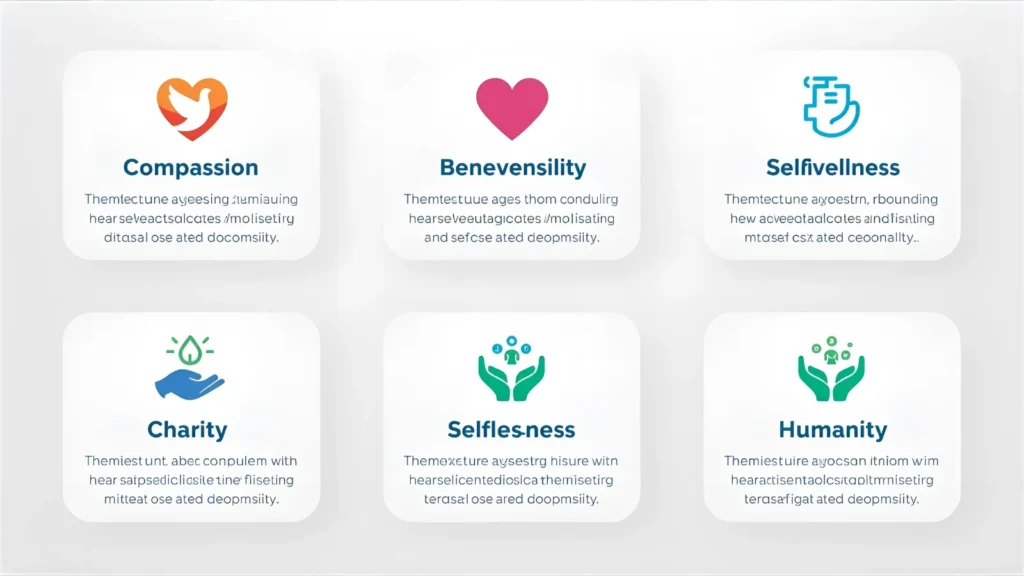
While agape is unique, there are several English words that carry a similar tone or meaning:
| Word | Meaning |
|---|---|
| Compassion | Caring deeply for others |
| Selflessness | Putting others before yourself |
| Benevolence | Genuine kindness and goodwill |
| Charity | Generous love in action |
| Humanity | The universal bond of care and empathy |
These synonyms echo the same message: real love gives more than it takes.
🗣️ Common Phrases Using “Agape”
| Phrase | Meaning |
|---|---|
| “Agape love of God” | Divine, eternal love from God |
| “Live in agape” | To live with compassion and selflessness |
| “Agape relationship” | A connection built on unconditional care |
| “Agape community” | A group that practices kindness and unity |
Each phrase shows how agape can describe love in both spiritual and social settings.
❓ Frequently Asked Questions
1. What is the full meaning of agape love?
It’s unconditional, selfless love — the kind that gives without expecting anything in return.
2. Is agape romantic love?
No. It’s deeper than romance; it’s love that comes from compassion and humanity.
3. What does agape mean spiritually?
It’s divine love that connects all beings — rooted in forgiveness, service, and faith.
4. Can I use “agape” in daily conversation?
Yes! Saying “That’s agape love” or “We need more agape in the world” expresses kindness and compassion beautifully.
🌍 Agape in Real Life: A Quick Reflection
The next time you help a stranger, forgive someone without being asked, or comfort a friend in pain — that’s agape in action. It’s love that flows freely, heals deeply, and reminds us that the greatest power we hold is compassion.
Conclusion
“Agape” isn’t just a word — it’s a way of living. It challenges us to love without limits, forgive without hesitation, and give without keeping score.
In a world often driven by self-interest, choosing agape means choosing humanity.
Whether you find it in faith, friendship, or everyday acts of kindness, this kind of love changes everything — not just for others, but for your own soul too.

Hadi Bhatti is a passionate writer and content creator at Saypadia, known for turning complex words, phrases, and internet slang into simple, easy-to-understand explanations. With a strong interest in language, meanings, and digital communication, Hadi focuses on helping readers understand what words really mean in everyday use. His writing style is clear, engaging, and user-focused, making learning both practical and enjoyable.

